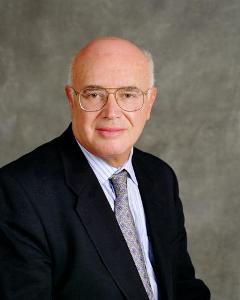Gabor Somorjai, a chemist who has been hailed as the "father of modern surface chemistry," and who holds joint appointments with the U.S. Department of Energy's Lawrence Berkeley National Laboratory (Berkeley Lab) and the University of California (UC) at Berkeley, has won a "Frontiers of Knowledge Award" from Spain's BBVA Foundation.
The award recognizes Somorjai for "his pioneering contributions to the understanding of surface chemistry and catalysis at a microscopic and molecular level." It comes with a cash prize of approximately $550,000.
 This is Gabor Somorjai of DOE/Lawrence Berkeley National Laboratory.
This is Gabor Somorjai of DOE/Lawrence Berkeley National Laboratory.
"Everything is chemistry, the fact you are talking is a chemical process involving the neurons in your brain," Somorjai said when notified of the BBVA Foundation award.
"Before our work it was impossible to study what was happening with molecules. We had to develop techniques that would allow us to look at the structure, composition and dynamics of chemical reactions as they proceed on the surface. If you can understand reactions at the molecular level you can also control them so you know you are heading in the right direction. All the beauty and potency of surface reactions are now laid out before us".
Somorjai is a senior scientist with Berkeley Lab's Materials Sciences Division, where he directs the Surface Science and Catalysis Program, and a professor of chemistry with UC Berkeley's Chemistry Department. He has won just about every honor a scientist can receive including the National Medal of Science, the Priestly Award and the Wolf Foundation Prize in chemistry. He will receive the BBVA Frontiers of Knowledge Award in the category of Basic Sciences.
Established in 2008, the Frontiers of Knowledge Awards are sponsored by the BBVA Group, a global financial services firm based in Spain. The awards "seek to recognize and encourage world-class research and artistic creation, prizing contributions of lasting impact for their originality, theoretical significance and ability to push back the frontiers of the known world."
Somorjai, 75, was born in Budapest, Hungary, to Jewish parents. In 1944, he managed to escape the Nazi regime with his mother and sister. In 1956, he was a fourth-year chemical engineering student at the Technical University when the ill-fated Hungarian uprising against the ruling Communist regime erupted. A member of the defeated freedom fighters, he became part of a wave of Hungarian students that emigrated to the United States in 1957. Somorjai enrolled in the graduate school at UC Berkeley and went on to earn his Ph.D. in chemistry in 1960. He became a U.S. citizen in 1962 in the midst of a four-year stint with the IBM research staff at Yorktown Heights, New York. In 1964 he returned to Berkeley as an assistant professor.
Somorjai is the author of more than a thousand scientific papers and three university textbooks. He has mentored more than 330 doctorate students and postdoctoral fellows. The American Chemical Society has named an award after him.
In their announcement of the award to Somorjai, the BVVA Foundation cited the pharmaceutical, agriculture and automotive industries as having benefited from his work. Somorjai's research has also helped facilitate the synthesis of semiconductor materials, the development of hydrogen-powered electric vehicles, and the observation and study of natural processes, such as the depletion of ozone in the stratosphere. In recent years, he has been at the forefront of nanoscience, studying catalytic reactions on the surfaces of nanoparticles to create prototypes for future high-tech catalysts.
Source: http://www.lbl.gov/